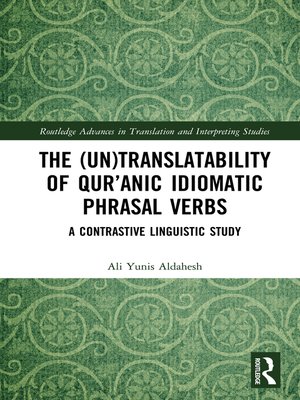The (Un)Translatability of Qur'anic Idiomatic Phrasal Verbs
ebook ∣ A Contrastive Linguistic Study · Routledge Advances in Translation and Interpreting Studies
By Ali Yunis Aldahesh

Sign up to save your library
With an OverDrive account, you can save your favorite libraries for at-a-glance information about availability. Find out more about OverDrive accounts.
Find this title in Libby, the library reading app by OverDrive.



Search for a digital library with this title
Title found at these libraries:
| Library Name | Distance |
|---|---|
| Loading... |
Qur'anic idiomaticity, in its all aspects, poses a great deal of challenge to Qur'an readers, learners, commentators, and translators. One of the most challenging aspects of Qur'anic idiomaticity is Qur'anic idiomatic phrasal verbs, where significances of proper Arabic verbs are entirely fused with significances of prepositions following them to produce new significances that have nothing to do with the basic significances of those verbs and prepositions.
By examining a corpus of ten of the most influential English translations of the Qur'an, this study scrutinizes how some translators of the Qur'an have dealt with the phenomenon of Qur'anic idiomatic phrasal verbs, the difficulties that they have encountered when translating them into English, and the strategies that they have employed in their attempts to overcome the inherent ambiguity of such expressions and provide their functional-pragmatic equivalents for English readership.
The study proposes a working model for analysing and assessing the translation of the Qur'anic idiomatic phrasal verbs and provides a number of theory-based recommendations for translators in general and Qur'an translators in particular.







